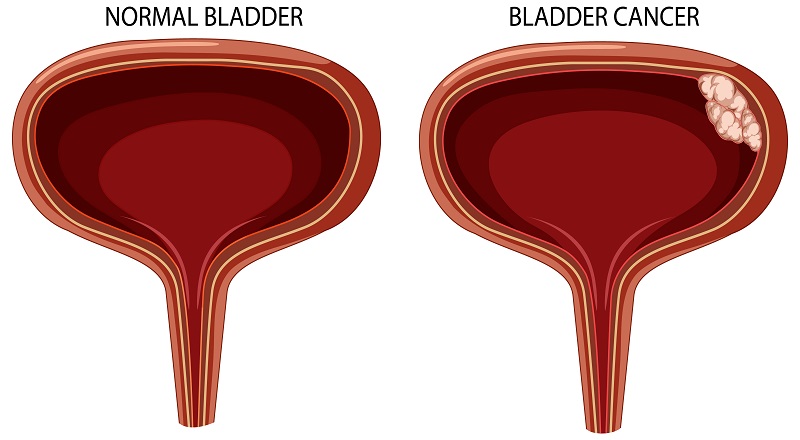Bladder Cancer Awareness Month is observed every May to raise awareness about bladder cancer, its symptoms, risk factors, and prevention. In this blog post, we will discuss the various treatment options available for bladder cancer, including surgery, chemotherapy, radiation therapy, and immunotherapy.
One of the most important things you can do to reduce your risk of bladder cancer is to avoid tobacco use. Smoking is the most significant risk factor for bladder cancer, accounting for more than half of all cases. Exposure to certain chemicals, such as those found in certain workplaces, can also increase your risk. Other risk factors include age, sex, race, and a personal or family history of bladder cancer.
If you have been diagnosed with bladder cancer, your treatment options will depend on the stage and grade of the cancer, as well as your overall health and preferences. In addition to the treatments discussed above, other options may include targeted therapy or clinical trials.
Surgery
Surgery is one of the most common treatments for bladder cancer, particularly for early-stage cancers that are confined to the lining of the bladder. The type of surgery recommended will depend on the size and location of the tumor, as well as the stage and grade of the cancer.
Transurethral resection of bladder tumor (TURBT) is a minimally invasive surgical procedure that is often used to remove small, early-stage bladder tumors. During this procedure, a surgeon inserts a thin, flexible instrument called a cystoscope through the urethra to access the bladder. The tumor is then removed using a wire loop that is passed through the cystoscope.
For larger or more advanced tumors, a partial or complete cystectomy may be recommended. During this procedure, the surgeon removes part or all of the bladder, as well as nearby lymph nodes and tissue. In some cases, reconstructive surgery may be necessary to create a new way for urine to leave the body.
Chemotherapy
Chemotherapy is a systemic treatment that uses drugs to kill cancer cells throughout the body. It may be used alone or in combination with surgery, radiation therapy, or immunotherapy to treat bladder cancer.
Chemotherapy drugs can be given orally, by injection, or directly into the bladder through a catheter. The specific drugs used and the duration of treatment will depend on the stage and grade of the cancer, as well as the individual patient’s health and preferences.
Radiation Therapy
Radiation therapy uses high-energy radiation to kill cancer cells. It may be used alone or in combination with chemotherapy or surgery to treat bladder cancer.
External beam radiation therapy is the most common type of radiation therapy used for bladder cancer. During this procedure, a machine outside the body delivers radiation to the tumor and surrounding tissue. Internal radiation therapy, also known as brachytherapy, involves placing a radioactive source inside the bladder to deliver radiation directly to the tumor.
Immunotherapy
Immunotherapy is a type of treatment that harnesses the power of the immune system to fight cancer. It works by stimulating the body’s immune system to attack cancer cells.
One type of immunotherapy used for bladder cancer is called Bacillus Calmette-Guérin (BCG) therapy. During this procedure, a weakened form of the tuberculosis bacteria is inserted into the bladder through a catheter. The bacteria stimulate an immune response that helps the body fight cancer cells.
Another type of immunotherapy used for bladder cancer is checkpoint inhibitors. These drugs target proteins on the surface of immune cells and cancer cells, allowing the immune system to more effectively identify and attack cancer cells.
Targeted therapy is a type of treatment that targets specific genes or proteins in cancer cells. It works by blocking the signals that allow cancer cells to grow and divide. Targeted therapy may be used alone or in combination with other treatments, such as chemotherapy or radiation therapy.
Clinical trials are research studies that evaluate new treatments or procedures for their safety and effectiveness. Participating in a clinical trial may give you access to treatments that are not yet available to the general public.
It’s essential to work closely with your healthcare team to develop a treatment plan that is tailored to your individual needs and preferences. Your healthcare team may include a variety of healthcare professionals, such as oncologists, urologists, radiation therapists, and nurses. It’s also important to communicate openly with your loved ones and to seek support from a counselor or support group if needed.
In addition to seeking appropriate medical care, there are several things you can do to support your overall health and well-being during and after treatment. These include eating a healthy diet, getting regular exercise, and managing stress.
The Best Cancer Doctor and Specialist in Lucknow
If you or a loved one has been diagnosed with bladder cancer, it’s essential to seek treatment from a qualified and experienced cancer doctor or specialist. Dr. Subraharsh Singh is one of the best cancer doctors and specialists in Lucknow, with extensive experience in diagnosing and treating various types of cancer, including bladder cancer.
Dr. Subraharsh Singh is a highly qualified and skilled oncologist who uses the latest diagnostic tools and treatment techniques to provide personalized care to his patients. He has a patient-centered approach to care, focusing on addressing the unique needs and concerns of each patient.
In conclusion, bladder cancer is a serious and potentially life-threatening disease. However, with early detection and appropriate treatment, many people with bladder cancer can achieve a good outcome. If you have concerns about your risk for bladder cancer or are experiencing any symptoms, talk to your healthcare provider. And if you receive a diagnosis of bladder cancer, know that there are many treatment options available, and with the right care, you can achieve a good outcome.
If you are looking for the best cancer doctor or specialist in Lucknow, consider Dr. Subraharsh Singh. With his extensive experience and patient-centered approach to care, Dr. Singh is dedicated to helping his patients achieve the best possible outcomes. Don’t hesitate to reach out to him or his team if you need support or guidance through your cancer journey. Remember, you are not alone, and there is hope for a brighter future.



